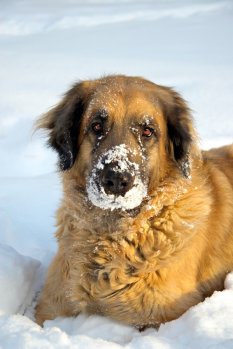 [an error occurred while processing this directive]
[an error occurred while processing this directive]
Walking in a Winter Wonderland
- Protect your pet from the cold (yes, even with all their
fur, pets DO get cold!). Specially-made jackets and
'booties' are some items that can help keep your pet
toasty warm.
- Know your dog's fitness level. Dogs that usually take
just a short stroll around the block may find a trek
through the deep snow a little too strenuous! Likewise,
short dogs may find themselves struggling to plow a
path through the snow. If you plan to do some winter
hiking with your dog, gradually increase your pet's
exercise until he's ready to accompany you on the trails.
- Check your pet's paws for "snowballs". Hard little
chunks of ice that form between the paw pads can be
extremely painful for your pet (think, "pebble in your
shoe"!). Help your dog remove these or have him wear
dog boots.
- Keep your dog's paws free of any chemicals used to melt
snow and ice. These chemicals can irritate the skin.
Wipe your dog's paws carefully with a moist towel to
remove any chemicals, or use 'dog booties' to protect
them.
- Be aware of other people enjoying recreational activities
on the trail, such as skiiers and snowmobilers. Try to
avoid trails that are primarily used for these purposes,
as a collision can be very dangerous for both the person
and for your pet. If your dog is off-leash make sure he
comes when called and will stay put when told.
- Be watchful for ice: keep pets away from lakes or other
bodies of water that may have thin ice; and walk dogs
with mobility problems (such as arthritic dogs) where
sidewalks or paths are clear of ice. Slipping can be
dangerous for pets, too!
- Look out for spilled antifreeze. Pets are attracted
to its sweet taste, however it is extremely poisonous and even
ingesting a small amount can be fatal. Contact a veterinarian
immediately if you believe your pet has consumed antifreeze.
- Bring water if you plan on going for an extended walk.
Snow is not a suitable substitute for water.
- Gently wipe your dog's paws with a moist towel after
a walk. The salt used to melt ice from sidewalks and
driveways can irritate or burn your pet's paws, or cause
even bigger problems if your pet licks the salt from his
paws. [some home & garden stores now carry salt that's
marked as "pet-safe"]
__________
© Copyright 2006, Pet Friendly Canada. All Rights Reserved.
To request reprint permission please contact us.
 Fresh air and exercise is important for both people and
pets. Winter offers crisp air and a magical landscape in
which to enjoy your outings together. Before you head
outdoors, consider the following:
[an error occurred while processing this directive]
Fresh air and exercise is important for both people and
pets. Winter offers crisp air and a magical landscape in
which to enjoy your outings together. Before you head
outdoors, consider the following:
[an error occurred while processing this directive]
Hotels, motels, resorts, and cottages for the whole family - pets included!
